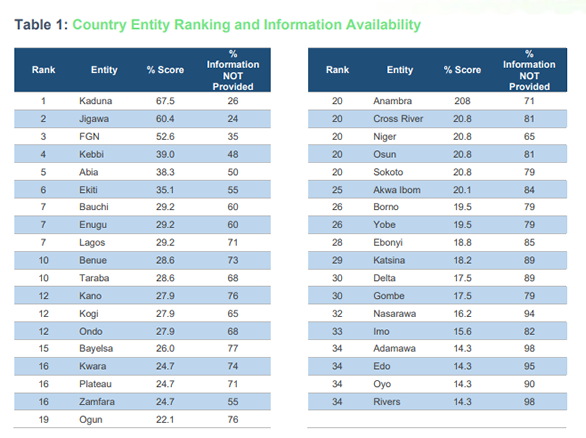Kogi records another milestone as ICAN Releases Inaugural Accountability Index Assessment Report

Amidst political hostility, media smearing and deliberate attack on the Kogi State government, the Governor Yahaya Bello led administration has continued to remain focused, pragmatic and outstandingly determined to take Kogi to the next level. There is no better way to access the accountability, investigate financial business of government and the account records of any government institutions apart from the independent professional bodies appraisal, in line with international best practices, norms and convention.
Until this undeniable and unquestionable revelations by the ICAN, political enemies of the government have sold unthinkable dommy to unsuspecting public about imaginary fraud, lack of accountability and the rest. As a tool for political wrestling, opposition has repeatedly claimed what this revelations shows to be untrue.
According to the 2019 ICAN accountability index assessment report, Kogi is the 2nd best in North Central and climbed up to 12th in Nigeria, a status Kogi has never attained in any known accountability test. The government of Alh. Yahaya Bello has now become a transparent and accountable government. Obvious deliberate policy implementation and massive developmental strides is no doubt on the upper scale of development compared to the previous administration.
Speaking on the development, Hon. Commissioner for Finance and the the head, Kogi State economic team, Hon Asiwaju Idris says the development is a manifestation of the accountable leadership of the Yahaya Bello led administration, the elated Hon. Asiwaju ascribed the feat to the transparent nature of the Governor, he says the news has also proven the naysayers wrong and vindicates the Governor and government from all baseless allegations and accusation of financial impropriety.
“I thank God almighty for this good news and I believe strongly that it has further shown to the public, the transparency, integrity and probity of the GYB led government. This ICAN accountability index assessment report is the clearest way to expose financial probity of the state. As a responsible government with penchant for transparency, we are encouraged and further vindicated by the report, ICAN is a professional body that conducts her programme and activities in line with international best practices, we will continue to do our best to make Kogi the best economy in Nigeria” – Hon Asiwaju Idris Says
See full report
State and Local Govts
Accountability in the management of public finance is a sensitive aspect of the activities of government at all levels. In Nigeria, lack of accountability and transparency in public finance has stunted the growth and development in every sector of the economy. The country is very far from where it ought to be as a nation as Nigerians continually experience poverty, inequality, unemployment and underemployment, deplorable infrastructure, among other social ills. The basic thinking in Nigeria has become one of accountability and transparency being treated as an aberration especially by those holding positions of responsibility in the public sector. The initiative of ICAN in responding to the situation is the development and launching of the ICAN Accountability Index (ICAN-AI). The ICAN-AI is one of a kind mechanism for assessing public finance management and public governance practices.
The initiative is innovative, timely and a welcome contribution to accountability and transparency in Nigeria. The initiative is particularly instructive given that the country just came out of a recession in which a negative GDP growth of -1.62% was experienced and Consumer Price Index increased to double digits in the region of 18.45%. The issue of unemployment has also not abated, rising to 18.8% in the third quarter of 2017. In all of these the government, especially at the Federal level has had to rely on debts to fund budget deficits.
In operationalizing the ICAN-AI, credibility was considered of great essence and as such the entire process was guided by the Fundamental Principles of the Accounting profession as contained in the ICAN Professional Code of Conduct for members and also by Section 23 of the 1999 Constitution of the Federal Republic of Nigeria (as amended) that deals with National Ethics as well as Section 162-168 on how revenue and expenditure are to be defrayed as well as other extant PFM legislations in Nigeria. In context, the ICAN-AI initiative is not an inquisition, but a tool designed to modify both the overt and the covert behaviour of those charged with governance and accountability, induce reforms, healthy competition between and among States, empower citizens and ensure continuous improvements in Public Finance Management (PFM) systems and accountability in Nigeria in line with global best practices.
The primary focus of the ICAN-AI is the Federal, State, and Local Governments. This is premised on the logic that governments at all levels should be instruments of improving the welfare of society. This is exemplified under Section 16(1) of the 1999 Constitution aforementioned where States are required to harness the resources of the nation to promote national prosperity and secure the economy while not sacrificing social justice and equity. The maiden edition of the ICAN-AI for the 2017 financial year excluded ICAN Accountability Index – Assessment Report for 2017 Fiscal Year The Institute of Chartered Accountants of Nigeria 2 the 774 Local Government Councils in Nigeria for logistics reasons but would be included in the subsequent editions.
The assessment was carried out by the ICAN-AI Steering Committee together with the Consultant appointed by the International Federation of Accountants (IFAC). The Federal and State Governments were ranked according to their level of performance on the basis of a number of variables which included: budget reliability; transparency of public finances; management of assets and liabilities; policy-based fiscal strategy and budgeting; predictability and control in budget execution; accounting and reporting; external audit and scrutiny.
Assessment of PFM Performance
The assessment of the PFM was quite comprehensive as the Federal Government and all the States participated even though responses to data collection were generally poor. For instance, information required for the exercise but not provided was as high as 98% in two (2) out of the thirty-six (36) States while the lowest was 24%. On average, the information requested of the Federal and State Governments but not provided with respect to the various dimension assessed was 72%. This is in-spite of the plethora of legislations and laws in Nigeria mandating the availability of such information to stakeholders. The table below shows the ranking of the country entities (FGN and States) in terms of overall performance and the level of information sought are not available.

Download Here – ICAN AI Assessment Report








